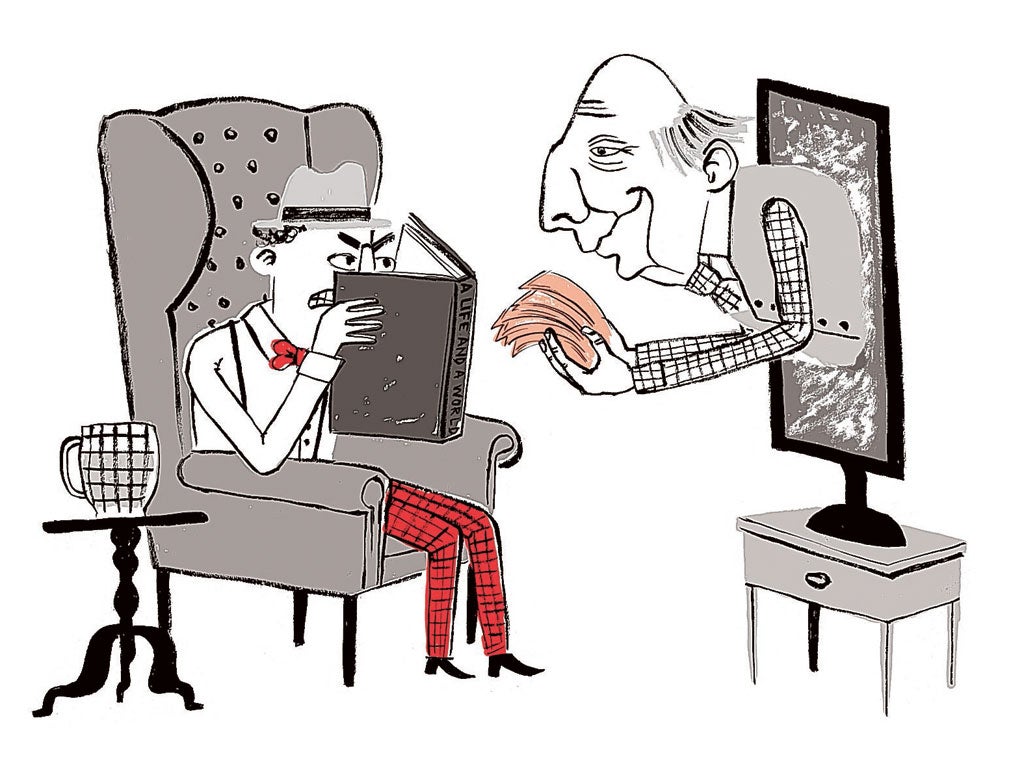Tom Hodgkinson: 'The only booming businesses are booze and payday lenders. No one buys books. The high streets are collapsing'

In the run-up to Christmas I found myself watching a lot of telly. My friends accuse me of hypocrisy since I used to rail against the evils of TV and even advised people, in a book, to chuck out their telly. I defend myself by blaming my children: I felt bad denying them the pleasures of schoolyard conversation about The X Factor.
My main argument with telly is not so much with the shows. It would be perverse and excessively curmudgeonly to deny the talents of, for example, the great Graham Linehan, co-writer of Black Books, The IT Crowd and Father Ted. It is rather with the stream of advertising they blast you with.
The ads that really got me fuming were the ones for payday lenders. The best known is Wonga, with its homely puppets of old people, but other immoral bean-counters have entered the fray, with names such as QuickQuid and Mr Lender, charging anything from 1,500 to 5,000 per cent interest. This kind of unvarnished usury was considered by the clerics of the Middle Ages to be a sin. We would call it exploitation.
The success of these companies suggests that, for ordinary people, our much-vaunted economic recovery is something of a fantasy. In the 18th century, the equivalent of payday lenders were the pawnbrokers’ shops. The busier the pawnbroker, the more parlous the country’s finances.
William Hogarth was the 18th-century artist with a conscience. Rather than painting grand portraits for wealthy clients as his contemporary Joshua Reynolds did, he chose to create series of moral fables, which he produced in low-cost editions so the ordinary man in the street could own them. The best known is probably Gin Lane, a horrifying portrayal of poverty, which famously shows a gin-addicted mother carelessly dropping her baby. Hogarth filled his pictures with symbols, and here we see that the only successful business on the street is the pawnbroker. There is a skeletal figure unsuccessfully trying to sell educational pamphlets. The independent barber shop is in ruins.
Is this so far from our reality today? The only booming businesses are booze and payday lenders. No one buys books. The high streets are collapsing. No one has the time or energy for self-improvement and self-education, those true goals of life. Instead, they distract themselves with telly and drinking. The owners of TV stations, mail-order internet companies, money-lending operations, cocaine cartels and social-networking sites coin it in while the rest of us cannot see till the end of the week, financially speaking. The money of the tycoons is directly syphoned from the poor and the weak.
Hogarth produced another print called Beer Street, which was a utopian vision to contrast with the dystopia of Gin Lane. Instead of gin, beer is the drink of the day. Everyone is reading books and pamphlets. Fisherwomen are reading self-improving tracts with one hand while holding a pewter tankard of fine ale in the other. The men are fat and jolly. Independent shops thrive. And, tellingly, the pawnbroker’s shop is in ruins.
To me, Beer Street remains an achievable fantasy. Perhaps perversely, I still believe that people do want to read, learn, debate and educate themselves. The internet began as a medium of communication. It quickly turned into a medium for selling ads. The sole purpose of companies such as Google, Facebook, YouTube and Twitter is to sell advertising. That is why they exist. But I believe that this year we will see a return to the internet’s genuinely democratic roots. In the case of the Idler Academy, we are exploring the fantastic potential of the internet to provide high-quality online education in a convivial setting. That has been the dream of every liberal-minded reformer since the Founding Fathers: a society not based on work and money but on the original Greek ideal of cultivated leisure.
It’s a dream worth pursuing.
Tom Hodgkinson is editor of 'The Idler'
Join our commenting forum
Join thought-provoking conversations, follow other Independent readers and see their replies
Comments
Bookmark popover
Removed from bookmarks